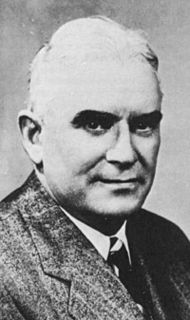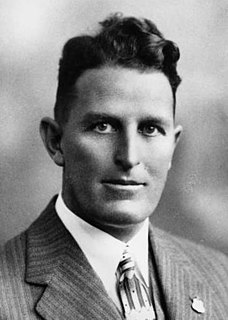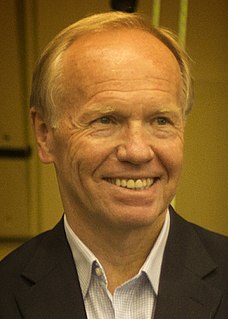
The United Fiji Party was a political party in Fiji. It was founded in 2001 by Prime Minister Laisenia Qarase as a power base; it absorbed most of the Christian Democratic Alliance and other conservative groups, and its endorsement by the Great Council of Chiefs (Bose Levu Vakaturaga) caused it to be widely seen as the successor to the Alliance Party, the former ruling party that had dominated Fijian politics from the 1960s to the 1980s. It draws its support mainly from indigenous Fijiians.

The Iowa caucuses are biennial electoral events for members of the Democratic and Republican parties in the U.S. state of Iowa. Unlike primary elections in most other U.S. states where registered voters go to polling places to cast ballots, Iowans instead gather at local caucus meetings to discuss and vote on the candidates. During both the presidential and midterm election seasons, registered Iowan voters vote in a per-precinct caucus for the party they are registered as a member. The caucuses are also held to select delegates to county conventions and party committees, among other party activities.

The 2001 Australian federal election was held in Australia on 10 November 2001. All 150 seats in the House of Representatives and 40 seats in the 76-member Senate were up for election. The incumbent Liberal Party of Australia led by Prime Minister of Australia John Howard and coalition partner the National Party of Australia led by John Anderson defeated the opposition Australian Labor Party led by Kim Beazley.

The 1998 Australian federal election was held to determine the members of the 39th Parliament of Australia. It was held on 3 October 1998. All 148 seats of the House of Representatives and 40 seats of the 76-seat Senate were up for election. The incumbent centre-right Liberal/National Coalition government led by Prime Minister John Howard of the Liberal Party and coalition partner Tim Fischer of the National Party defeated the centre-left Australian Labor Party opposition led by Opposition Leader Kim Beazley.

The Family First Party was a conservative political party in Australia from 2002 to 2017. It was founded in South Australia and enjoyed its greatest electoral support in that state.

The 1952 British Columbia general election was the 23rd general election in the Province of British Columbia, Canada. It was held to elect members of the Legislative Assembly of British Columbia, alongside a plebiscite on daylight saving time and liquor. The election was called on April 10, 1952, and held on June 12, 1952. The new legislature met for the first time on February 3, 1953. It was the first general election to use a preferential ballot, a short-lived phenomenon in BC. The presence of multi-member districts such as Victoria City with 3 MLAs in conjunction with the Alternative voting system called for an innovation where the district's slate of candidates was split into three "ballots," each with one candidate from each party.
The Fishing Party (TFP) is a minor Australian political party whose primary support base is found among recreational fishers. The party was founded by Robert Smith in July 2000 and it has branches in several Australian states. It is headquartered in Singleton, New South Wales (NSW).

Sir George Francis Reuben Nicklin, was an Australian politician. He was the Premier of Queensland from 1957 to 1968, the first non Labor Party premier since 1932.
The Douglas Credit Party was an Australian political party based on the Social Credit theory of monetary reform, first set out by C. H. Douglas. It gained its strongest result in Queensland in 1935, when it gained 7.02% of first preferences under the leadership of the psychiatrist Dr Julius Streeter. Streeter had returned to Australia in 1919 as a war hero after being a surgeon in the Battle of Ypres where he was injured by mustard gas.

The Queensland Greens is a Green party in the Australian state of Queensland, and a member of the federation of the Australian Greens. The Greens were first founded in Queensland as the Brisbane Green Party in late 1984 about a month after the Sydney Greens. The Brisbane Green Party contested the March 1985 Brisbane City Council elections with four ward candidates and Drew Hutton as mayoral candidate. Hutton received 4 per cent across the city and the ward candidates received approximately 7-10 per cent. Some time after the collapse of the Brisbane Greens, a Green Independent campaign stood a further range of candidates in the 1989 Queensland state election.

Elections were held in the Australian state of Queensland on 13 June 1998 to elect the 89 members of the state's Legislative Assembly.

The Nevada caucuses are an electoral event in which citizens of the U.S. state of Nevada meet in precinct caucuses to elect delegates to the corresponding county conventions. There are 17 counties in Nevada and so there are 17 conventions. The county conventions then select delegates to Nevada's State Convention, which then choose delegates for the presidential nominating conventions.

Pirate Party Australia is a political party in Australia that has traditionally represented civil liberty issues, but has also expanded into more traditional areas of policy. It is a Pirate Party which is based on the Pirate Party of Sweden, and has continued to develop a comprehensive policy platform since its formation based on the Pirate ethos.

The 2012 United States presidential election in Missouri took place on November 6, 2012, as part of the 2012 general election, in which all 50 states plus the District of Columbia participated. Missouri voters chose 10 electors to represent them in the Electoral College via a popular vote pitting incumbent Democratic President Barack Obama and his running mate, Vice President Joe Biden, against Republican challenger and former Massachusetts Governor Mitt Romney and his running mate, Congressman Paul Ryan.

Animal Justice Party (AJP) is a political party in Australia founded in 2009. The party was registered by the Australian Electoral Commission (AEC) on 3 May 2011, making the party eligible for federal funding, should the party achieve the funding threshold of 4%. The party is also registered in New South Wales, South Australia, Victoria, Western Australia, and the Australian Capital Territory. The AJP is the first political party in Australia formed solely to advance animal welfare issues.

The 2016 Green Party presidential primaries were a series of primaries, caucuses and state conventions in which voters elected delegates to represent a candidate for the Green Party's nominee for President of the United States at the 2016 Green National Convention. The primaries, held in numerous states on various dates from January to July 2016, featured elections publicly funded and held as an alternative ballot, concurrent with the Democratic and Republican primaries, and elections privately funded by the Green Party, held non-concurrently with the major party primaries. Over 400 delegates to the Green National Convention were elected in these primaries, with a candidate needing a simple majority of these delegates to become the party's nominee for president.

The 2016 United States presidential election in Minnesota was held on November 8, 2016, as part of the 2016 general election in which all fifty states and the District of Columbia participated.
The Australian Sex Party was an Australian political party founded in 2009 in response to concerns over the increasing influence of religion in Australian politics. The party was born out of an adult-industry lobby group, the Eros Association. Its leader, Fiona Patten, was formerly the association's CEO. Patten described the party as a "civil libertarian alternative". Patten is a veteran campaigner on issues such as censorship, equality, and discrimination. Patten was elected to the Victorian Legislative Council at the 2014 state election.
This is a list of electoral district results for the 1932 Queensland state election.
















